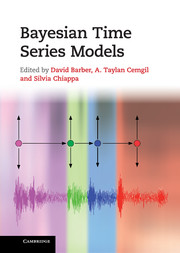Book contents
- Frontmatter
- Contents
- List of contributors
- Preface
- 1 Inference and estimation in probabilistic time series models
- I Monte Carlo
- II Deterministic approximations
- III Switching models
- IV Multi-object models
- V Nonparametric models
- VI Agent-based models
- 17 Optimal control theory and the linear Bellman equation
- 18 Expectation maximisation methods for solving (PO)MDPs and optimal control problems
- Index
- Plate section
- References
17 - Optimal control theory and the linear Bellman equation
from VI - Agent-based models
Published online by Cambridge University Press: 07 September 2011
- Frontmatter
- Contents
- List of contributors
- Preface
- 1 Inference and estimation in probabilistic time series models
- I Monte Carlo
- II Deterministic approximations
- III Switching models
- IV Multi-object models
- V Nonparametric models
- VI Agent-based models
- 17 Optimal control theory and the linear Bellman equation
- 18 Expectation maximisation methods for solving (PO)MDPs and optimal control problems
- Index
- Plate section
- References
Summary
Introduction
Optimising a sequence of actions to attain some future goal is the general topic of control theory [26, 9]. It views an agent as an automaton that seeks to maximise expected reward (or minimise cost) over some future time period. Two typical examples that illustrate this are motor control and foraging for food.
As an example of a motor control task, consider a human throwing a spear to kill an animal. Throwing a spear requires the execution of a motor program that is such that at the moment that the hand releases the spear it has the correct speed and direction to hit the desired target. A motor program is a sequence of actions, and this sequence can be assigned a cost that consists generally of two terms: a path cost that specifies the energy consumption to contract the muscles to execute the motor program, and an end cost that specifies whether the spear will kill the animal, just hurt it, or miss it altogether. The optimal control solution is a sequence of motor commands that results in killing the animal by throwing the spear with minimal physical effort. If x denotes the state space (the positions and velocities of the muscles), the optimal control solution is a function u(x, t) that depends both on the actual state of the system at each time t and also explicitly on time.
Information
- Type
- Chapter
- Information
- Bayesian Time Series Models , pp. 363 - 387Publisher: Cambridge University PressPrint publication year: 2011
References
Accessibility standard: Unknown
Why this information is here
This section outlines the accessibility features of this content - including support for screen readers, full keyboard navigation and high-contrast display options. This may not be relevant for you.Accessibility Information
- 28
- Cited by
